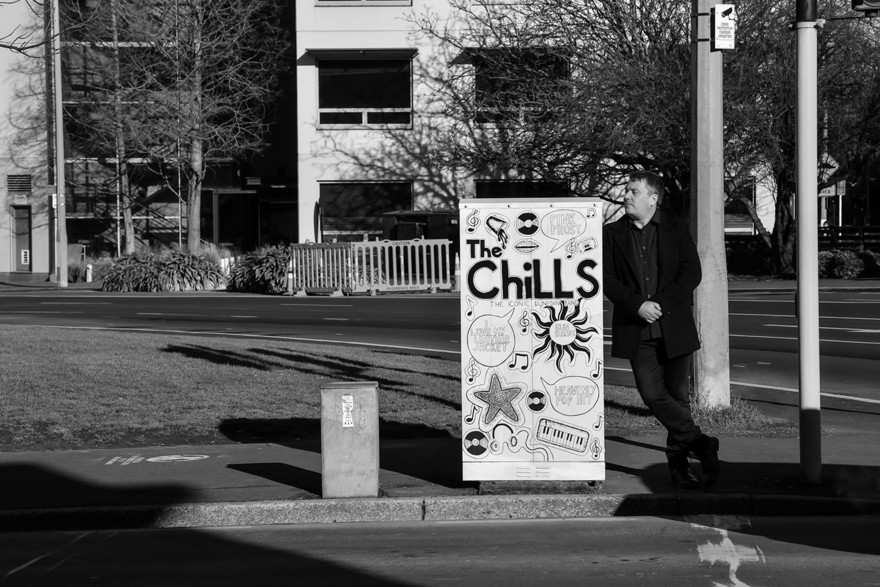
Martin Phillipps in Dunedin, 2018, with a Chorus box celebrating the Chills. - Photo by Chris Sullivan
Continued from Martin Phillipps Remembered: Brave Words 1
--
Andrew Boak
When you know someone for a very long time, the memories will obviously increase, but you don’t tend to recall them regularly, until something happens. So has been the case for the last 24 hours for me. Great memories have come flooding back, of times that were either with Martin, or Martin based.
Of course, along with the memory flood, comes the flood of tears.
It’s normal human grief, but when the person has been in your life as more than just a casual acquaintance, for decades, it just feels so much deeper and saddening.
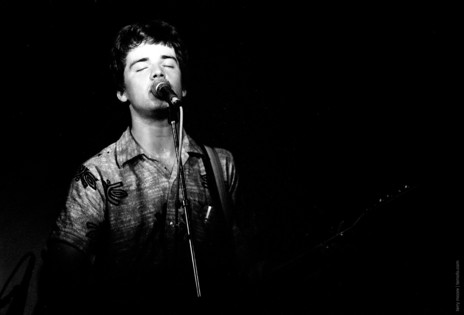
Martin Phillipps photographed during the Looney Tours, venue unknown. - Terry Moore
I can still vividly remember seeing Martin with The Chills at The Windsor Castle, in the early 80s, back when bands did two or three nights at a venue in a row, or up at The Rumba Bar on a Saturday afternoon. Great gigs, I always came out of them with the endorphins pumping and buzzing, and that wasn’t because of the weak tap beer either!
You could always expect a decent show from the multitude of lineups over the years, because the beautiful cacophony started with Martin ...
I remember going to the penthouse reception area on the top floor of New Zealand House in London (with a view of Trafalgar Square!) for a “signing” party for the band. Craig, the band’s manager at the time, flew in 40 dozen Bluff oysters and unlimited Steinlager, for another Martin/The Chills memorable evening, which in this case wasn’t even a gig!
I remember being on the Soft Bomb tour of the US as a roadie/guitar tech/driver, and somehow not concentrating enough at a gig in Montreal. I ended up tuning Martin’s pedal steel to E minor, instead of E major. Rather than being too angry, Martin had his revenge by introducing me as the “guitar tech” who tuned the pedal steel guitar wrong, when I came on stage to get it after the couple of songs he used it for.
Martin was like that, never really mean, at least to me, but very sly and sneaky on dropping jokes about your error, etc. He was a brilliant mind, for sure, and could keep a straight face after dropping a joke, much better than most.
Then there was the time hanging out around the pool, sipping martinis around at Madonna’s house in the Hollywood hills ... the memories go on and on ...
From that brilliant mind, also came the songs, all of them being top quality in their composition, with some having such great hook-line riffs or vocal melody, it was impossible to not sing along.
I even went to the screening of the film when I was in Wellington with my wife Cathy, stopping over with Ben and Sonya, who took us along. It was kinda surreal, as all four of us knew Martin quite well, in similar, but differing scenarios.
That was Martin’s reach, didn’t matter who or where you are, his brilliance would reach you somehow.
Martin, I will miss you, and The Chills, dearly, but thanks to modern audio and video recording, we will have some of those memories to look back on, even as we ourselves age into the ether.
Hugs to all
Andrew
Andrew Boak is a New Zealand musician based in San Francisco
Earl Robertson
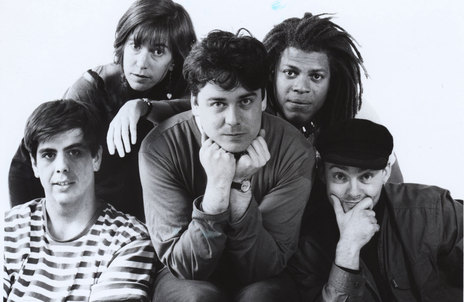
The Chills in the mid-1990s: Steve Schayer, Lisa Mednick, Martin Phillipps, Earl Robertson, Terry Moore - Photo by Becky Nunes
If it wasn’t for Martin I wouldn’t even be in New Zealand.
It was 1991 and booking agent Pat Magnarella encouraged me to audition with The Chills, who were recording in LA and needed a drummer. Martin Phillipps sent me a cassette of 40+ songs from the 80s through to the Soft Bomb demos. I headed from San Fran to LA, auditioned successfully, then ventured to Auckland in 1992 for two weeks’ practice prior to the NZ/Aussie Soft Bomb tour which ended in Sydney. I returned to New Zealand the following year, when Martin and I reconnected for a memorable in-store duo at Real Groovy.
Our paths crossed many times during my now 32 years in New Zealand, in many capacities and sometimes nefarious scenarios. My partner fondly recalls Martin, me and Jordan Luck writing a drunken Christmas song at Jordan’s place in Western Springs. I wonder whatever became of that …
The last time I saw Martin was a couple of years ago opening for The Chills at the Yot Club in Raglan. We were meant to catch up while I was in Dunedin this June for the VRV [Voom-Reb Fountain-Vera Ellen] tour, but we missed him due to an early flight call. And now I am going to keep missing him – his keen intelligence, encyclopedic musical knowledge, adventurous and experimental approach to writing, his vast and varied collections and all those nuances that made Martin interesting and enduring and irreplaceable.
Earl Robertson is a US-born drummer, and a member of The Chills in the 1990s
Steven Shaw
I met Martin through the classifieds. Sometime in 1993 he placed an ad in Rip It Up, on the lookout for a new band line-up. The Chills as we knew them then had recently folded, but he was still reaching for those stars.
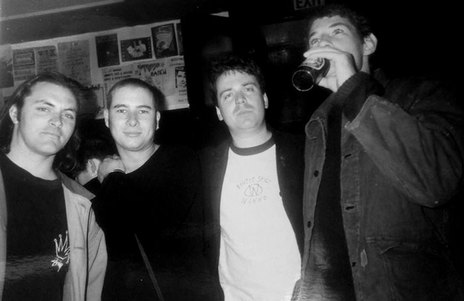
Martin Phillipps and the Chills, Dunedin 1996. L to R: Steven Shaw, Jonathan Armstrong, Martin Phillipps with Sean O'Reilly (King Loser)
I wrote to him and didn’t really expect a reply, but he did get back to me. There was a series of letters over the next year, updating me on where he was at with clearing his previous contracts, etc. He started sending cassette demos. Not just 4-track either, some were studio recordings with notable Dunedin musicians backing him. Supergroup stuff. There were songs and album titles for his next THREE prospective albums. And as soon as he could see a plan forming, he began visiting Auckland to start making music with a new line-up: Dominic Blaazer, Jonathan Armstrong, and me.
Martin’s view was that if you can write great songs or create great art, you have a certain duty to your talent and to the world to develop that craft. And maybe it was his collecting side, but he knew to document it all along the way.
I formed some of my most enduring friendships because of Martin. I still make music with friends I met through him. On a double bill in Howick, I met the group Garageland; a few years later I filled in on bass with them. At the Flying Nun 21st anniversary celebration in 2002, we recorded a surf instrumental version of ‘Heavenly Pop Hit’. That was a bit of a circle.
And for some years now I’ve been working at AudioCulture, helping to document Aotearoa New Zealand’s music history. I don’t believe any of that would have happened without Martin coming along.
We did stay in touch over the years, although naturally there were long stretches without contact. It was always a delight to find a message from him (“have you guys had that kid yet?”) or to get a hug from him at a music event.
I’ll miss you, Martin. I can still picture you, hopping in the tour van in your blue jumper and black jacket, always with a sense of optimism and adventure.
Martin stayed at my flat a lot during 1995 and 96. When friends or strangers would meet him and call him a “Kiwi icon”, he’d come back with a dry but friendly, “Mate, I’m the fucking Buzzy Bee!”
Steven Shaw, editor of AudioCulture, played bass for The Chills in the 1990s
Trevor Reekie
I have nothing but respect for the achievements of the late Martin Phillipps ... he always was an articulate, interesting and intelligent man blessed with a comprehensive understanding of pop culture. I love that stuff.
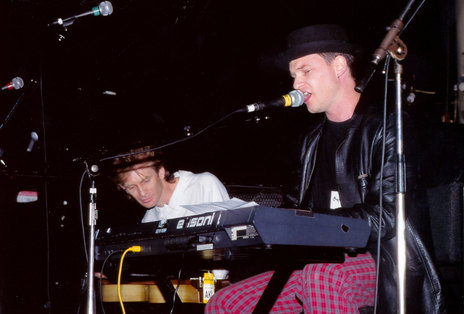
Trevor Reekie on stage with Greg Johnson in the late 1990s
I remember on a 90s tour of the South Island in the Greg Johnson Band, Martin joined us for that leg of the tour. He was opening solo for us for the South Island dates. We started out bright and early and headed up to the address where we were to pick up Martin. He was standing outside waiting for us to arrive, with his Mum. That alone speaks volumes about him.
Martin was a great original songwriter and there are more than a few songs in his catalogue that I genuinely loved … on top of that, I’m from Dunedin and continue to love the place and understand the musical dynamic that is pivotal to the appeal of that city. As did Martin.
When I visited Martin at his home one time to conduct an RNZ interview, I was fascinated by his obvious “collector” mentality. I’ve not really seen that much stuff, all categorised and meticulously stored, but even more, I was impressed by the logic of how they were archived.
However, its really the songs that Martin wrote and recorded that defined him. There was no questioning his compositional skills. Martin took his song writing seriously and equally trusted and embraced his writing skills. He trusted his motivation in his own creativity and that in turn enforced the motivation in his own belief.
I watched Martin every night on that tour with Greg and his performance hardly never faltered. The experience he gleaned over the years counted for everything. I equally applaud that Martin knew he was good.
Rest in peace, Martin Phillipps. You deserve the love you achieved.
Trevor Reekie is a musician (Car Crash Set, Trip to the Moon), and RNZ producer
Charlotte Yates
Lured by the imagery of Pink Frost and the depth of Submarine Bells, I invited Martin Phillipps join the lineup on a compilation album of poems by James K Baxter set to songs by 12 New Zealand recording artists. Martin chose one of the last poems Baxter wrote from a series of sonnets called Autumn Testament, published shortly after Baxter’s death in 1972.
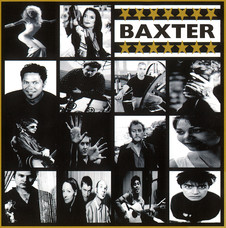
The James K Baxter compilation produced by Charlotte Yates, 2000
The poem ‘Autumn Testament 20’ contributed to the breadth of Baxter’s catalogue on the album. It’s spare – seven non-rhyming couplets – and Martin through-composed the piece which came in at 1 minute 47 seconds: the shortest on the album.
Part of the commission offer was support from RNZ for artists to record and mix at Auckland’s Helen Young Studio with the highly respected Andre Upston engineering. Martin was well prepared for recording with an extremely clear, creative vision. No guitars, the song is keyboard based and mirrors the tale of a kehua appearing to Baxter in a dream at the Jerusalem commune in a presentiment of death, thwarted by switching on the light and reading the French Catholic theologian, Peter Marin.
Martin used a tritone (C-F#) – the “devil’s interval” – right at the start of the track, along with cicadas and a sample of Baxter’s voice to set the scene. He urgently speaks the first couplet, while the soundscape fills with boiling wind and a piano motif reinforcing the tense Lydian mode.
He doesn’t sing until near halfway through the murk of the ghostly interaction. Then the cinematic music modulates on the lyric “so I crossed over and switched on the light” from C Lydian to C Major with lush descending bells and Martin in full voice, with a joyful plagal cadence, “amen-ing” the song to closure.
Live, Martin continued his aesthetic in concerts for the Baxter album, painting his face half red and half blue, and he stood blue side on to the audience, turning to the other side halfway through the song. I loved his approach musically and his gutsy intention to deliver that live in an unexpected fashion. Neither of us were sure audiences appreciated the effort – it wasn’t The Chills. But he was the right man to animate this poem which expressed the intense religiosity of Baxter without subscription to belief.
From an email Dec 1, 1999:
“Hi Charlotte
Glad you like it. I’m very happy with it – unlike anything I’ve done … It has been a positive, confidence-building exercise and very timely and I truly appreciate your faith in my ability to bring it off … My Dad’s a minister and I’ll make sure you get into heaven! OK?
Take care, love Martin.”
Charlotte Yates is a musician and songwriter
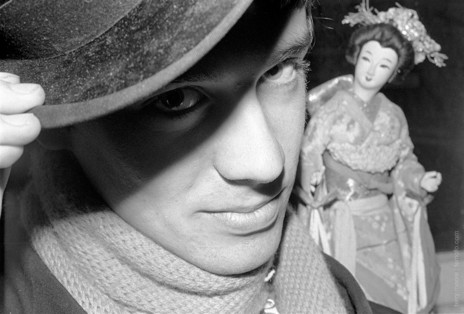
Martin Phillipps, from a series of photos that became the cover of the Chills side of the Dunedin Double EP (poss 1980) taken in the old Bored Games practice rooms in the Regent Theatre Dunedin - Terry Moore
Scott Muir
Martin.
There are so many Martins it’s hard to know where to begin.
Martin the rock star, Martin the collector, Martin the completist, Martin the pop-culture guru, Martin the determined songwriter, Martin the man who was able to make himself at home wherever he was, Martin who had SO much time for his fans, Martin the recluse, The Martin who couldn’t cook to save himself, The Martin with a magical sense of whimsy, The Martin who loved the dark side.
Martin – my friend.
Our relationship was 24 years in the making and the loss I feel is beyond huge. This is a man who committed himself 110% to his chosen craft and would not let anything get in the way of that.
Thanks to Martin I have met many many lovely generous people who kept the flame flickering for him through even his darkest times. That he could hold on to that, is testament to his bravery and determination to continue on – until his body couldn’t. I am enormously privileged to have spent so much time with Martin and despite his sometimes-infuriating ways I would not give any of that back for all the riches in the world.
My life is all the richer for having known you, Martin.
RIP. Scott
Scott Muir, from Ōtepoti Dunedin, managed The Chills and Martin Phillipps
Michael Brown
It was 1993. I’d moved to Dunedin for a year and been drawn into exploring the many tributaries of The Chills’ music, in the city that forms its spiritual wellspring. Starting with the just-released Soft Bomb album, it’s a listening journey that has never really ended. Martin Phillipps was possessed of a unique musical compass, divining cadences and overtones that always reward the ear, lending weight and mystery to his heartfelt songs filled with lost lovers, rolling moons, sleeping giants, water wolves, and more.
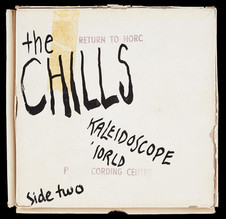
Kaleidoscope World tape box - Alexander Turnbull Library Ref: FLYT7-035.
Our paths crossed 20 years later. We shared an interest in myths and legends and, through his friendship with artist Mat Tait, Martin generously supplied an endorsement for our graphic novel of New Zealand folk stories The Heading Dog Who Split in Half. Then, in 2018, when Flying Nun Records donated its archive of recordings to the Alexander Turnbull Library (part of the National Library of New Zealand), as Music Curator I became involved with Martin’s creative legacy. Included in the Flying Nun archive are around 75 Chills tapes: production masters for many of the early releases, multitracks, demos, and live recordings. These fragile artefacts are now protected in climate-controlled vaults, and most have been digitally preserved: timeless music preserved in perpetuity. One early result of this archival effort is the 2022 remixed and expanded version of Brave Words, based on high-res files supplied by the Turnbull.
More achievements will surely come to light. Back in 1992, Murray Cammick interviewed Martin in Rip It Up for the Soft Bomb release and, even then, he spoke of a backlog of “unreleased Chills songs that we’ve played live, up to 80 to 100 that have been worked on at various stages, some 400-500 riffs.” I suspect we’ll still be discovering and marvelling at the music of Martin Phillipps and The Chills for many years to come. Thank you Martin.
Michael Brown is music curator at Alexander Turnbull Library, Wellington
Amanda Mills
The first time I met Martin Phillipps was at Chicks Hotel in 2012. He sat beside me on the sofa and throughout the evening told me stories about the bands he knew and gigs he had seen. It was a wonderful introduction. Over the years we built a friendship and a professional connection, which began when Hocken Collections hosted the launch of the live Chills album, Somewhere Beautiful in 2013. This was the collector’s edition of the album, with each box having unique prints by the artist Shane Cotton – a fitting edition for a collector.
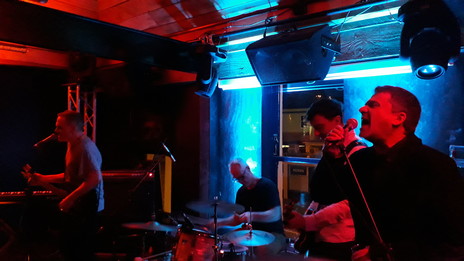
Shayne Carter, Gary Sullivan, James Duncan and Martin Phillipps at The Cook, August 2017. Photo by Amanda Mills - P2018-037-006, Hocken Collections Uare Taoka o Hākena
Martin was an avid collector of material relating to his own career, his peers’ careers, and the music and artists he loved. He amassed recordings, posters, photographs, memorabilia. He accumulated toys, films, objects, ephemera and paraphenalia. They were all an extension of him and what he loved. In 2018 Martin’s collections were exhibited in the Tūhura Otago Museum exhibition Things Change: Martin Phillipps and The Chills, which told his story through his extraordinary, weird, and wonderful collections. They were, in his own words, vast. He loaned his iconic, beloved leather jacket and the original Fimo artwork for the Kaleidoscope World album (and the song title) to the Hocken for our 2021-2022 exhibition Kaleidoscope World: 40 years of Flying Nun in Dunedin. He later generously donated the Fimo artwork to the Hocken. It is a very special piece.
On a visit to his house in 2017 to see his collections I was in awe of the recordings he showed me, the piles of posters and boxes of photographs, the figurines and toys. He was right, his collections were impressive. He initially planned to sell or give away a lot of his material, a way to downsize and create a bit more order out of the chaos. He didn’t – then – but seven years later he started the process of selling material online. Posters were sold to fans, collectors, and the Hocken, which continues to collect and archive his musical (and artistic) career.
At the Hocken I am surrounded by traces of Martin: his recordings, his posters, photographs of him and The Chills, the Kaleidoscope World artwork, an oral history. But, when it comes down to it, my favourite memory of Martin remains him preparing for that album launch in 2013, walking around the foyer of the Hocken playing his guitar and singing, searching for sonic perfection.
Amanda Mills is the Curator Music and AV at Hocken Collections in Ōtepoti Dunedin
Natasha Griffiths
I was 17 when The Chills played their triumphant Submarine Bells show at the Dunedin Town Hall. What a gig. That was a time where our musicians would come home and let us know there was a whole (weird) world waiting out there. Just what we needed to hear.
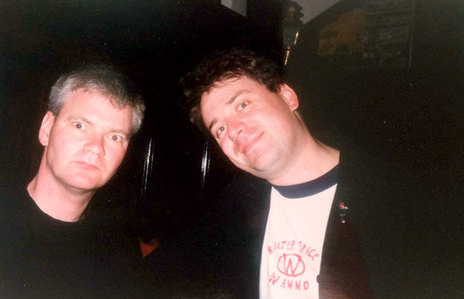
Roger Shepherd and Martin Phillipps. - Photo by Natasha Griffiths
While those early Chills records were a regular soundtrack to my life, bumping into Martin around town was the norm, it did not take long for the awestruck feeling to (mostly) disappear. Martin was friendly, interested, sweet, as well as supportive, and protective. When I had my 21st party at my brother Shayne’s Vogel Street flat, I found out at the end that Martin had stood at the entrance all night, asking those he didn’t recognise “how do you know Natasha” and if they didn’t, he sent them on their way. Some stunned faces as they were banished by Martin Phillipps. I’m glad my personal bouncer could still see the bands from that spot.
Not long after that I was working at Flying Nun and did a number of media campaigns with Martin. We’d meet to prepare, and it was fine when his mind drifted away to the songs in his head, it was a privilege to sit silently in that space. He was brutally honest in his interviews, hardened music journalists would call afterwards, whoa, they’d say.
The last time I saw The Chills, my then 17-year-old son’s band Blisspoint was opening for them. (Martin’s support for subsequent generations of musicians always shone through). That Chills lineup, with Oli, Callum, Erica and Todd, was the band that did justice to Martin and his songs all around the world in recent years. I jumped up and down and sang along, and cried all the way through ‘Wet Blanket’. It was fabulous.
Martin saw the world in a beautiful, unique way. We are so lucky he was able to translate those thoughts and wonder into the soundtrack of so many of our lives, especially in Dunedin, where we really needed it. That was his superpower.
Natasha Griffiths worked for Flying Nun Records for many years, and remains active in music promotion
Labretta Suede and Johnny Moondog
This is a galactic loss for Aotearoa. Martin was a national treasure, a true artist, a musical pop guru and a generous and sweet guy.
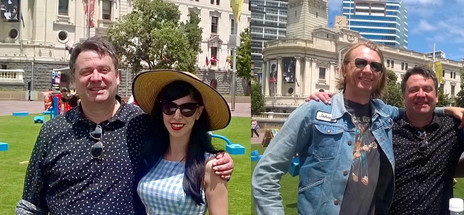
Martin Phillipps photographed in Auckland's Aotea Square with Labretta Suede and Johnny Moondog
Losing this gentle and complex soul from our realm will leave a resounding void of silence for many of us. Can anyone really remember a New Zealand music scene without him in it?
Well, maybe Chris Knox. As my understanding goes, Martin hounded Chris to be included with his first band. Literally banging on his door. Hey, it worked!
If only the music community were that innocent and inclusive nowadays. Flying Nun helped create a sense of community for bands of that era. Something we personally longed for in New Zealand but our band seemed to have to reinvent the wheel of community.
Martin recognised how weirdo rock’n’roll was the best form of rock’n’roll and art. He also appreciated how difficult it is to get ahead in that space. His olive branch of friendship was so out of the blue. His love, support and genuine understanding for what we were doing out in the world as an international touring band sideswiped us. We were amazed that someone like Martin Phillipps was even aware of us as a band. Let alone acknowledging that what we were doing was one of the toughest mediums.
A quote from Martin: “Weirdo Rock! It’s odd that even some of the younger members of my band are nervous to distinguish between awful misogynistic testosterone rock and the other aspect which brought an expression of sexual freedom to music (and therefore all the arts) to what became all genders. It’s still the best art form that’s ever been!”
He was a friend, a fan, an admirer, a confidante, a carer, and a nurturer. He became a huge part of our life and will be missed immensely.
He had a way of creating beauty from the grotesque. Much like the dichotomy that is New Zealand – breathtaking, but so bleak and ominous too. He was an unparallelled songwriter that wrote from a place of honesty and true humanity. A rare gem that we were so honored to call a good friend.
Who’s gonna check in on us now while we navigate the ever-shifting time and space of touring the world and living in the USA? Meet you in outta space Marty 🛸
Love, your Rock ’n’ Rollers from Mars
Labretta and Johnny Moondog
Labretta Suede and Johnny Moondog (Labretta Suede and the Motel Six) are New Zealand musicians based in the USA
Julia Parnell
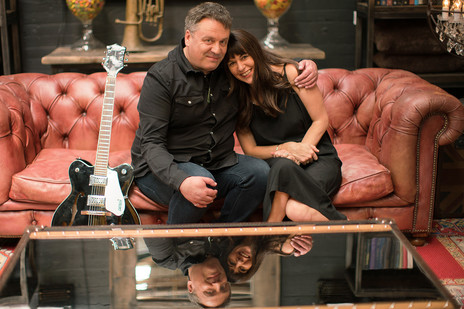
Martin Phillipps and Julia Parnell - Kirsty Griffin
When I first met Martin Phillipps, it was with the potential to take on directing a feature film about The Chills. Little did I know that meeting him would dramatically change both our lives. Sitting there on Vogel Street in Dunedin, near where he and The Chills first rehearsed his iconic song ‘Pink Frost’, I was immediately struck by Martin’s vulnerability and openness. Despite the myriad challenges he faced – including battles with addiction and health issues – Martin remained incredibly passionate and dedicated to his craft. I immediately felt a connection between us; he was a profoundly fascinating and complex individual; how could I not want to work with him? From there, we set about on what turned out to be a three-year journey to make and release his film, The Chills: The Triumph and Tragedy of Martin Phillipps.
Working on the documentary, I witnessed firsthand Martin’s remarkable resilience. He was captivating, articulate, and brutally honest about his life and his mistakes. His cheeky grin and irreverent, verging on bleak, asides were ever-present, even as he confronted his own mortality.
Early in the filming, Martin was told he had only a few months to live if he didn’t make significant lifestyle changes. This dire prognosis set the tone for our documentary, making it an urgent and deeply personal exploration of Martin’s life. His home was a treasure trove of curiosities, reflecting his collector’s spirit and providing a tangible connection to his past. These items became the vehicle for us to unpack his life. He once said, “It hasn’t been an easy process because I’ve had to confront issues of my past and my personality that I would rather not have done. But Julia encouraged me to be as honest as possible, to reach into myself for the most difficult kind of outpouring of memories and emotion I’ve ever had to do.” That was incredibly brave.
When the film came out, some people thought I was a bit harsh in saying, “Now he can put away those excuses that he used to make about the bad things that happened, accept his part in those things, and move forward really positively with the music that he’s making.” But that is how he felt too. He said at the time, “I feel I can really stand tall now, and make the most of whatever time I have left,” and he truly lived up to those words, embarking on Australasian, US and European tours and creating new music that left us all in awe.
Going through the intense years of making the film and assessing his life built a very unique friendship between us that has been incredibly important to me. Martin was not just a subject of my documentary; he became a phenomenal supporter and cheerleader in my life. For a man with many fans, he really knew how to be the biggest fan of others’ work, and he certainly always did that for me. I will hold his confidence in me within my heart. Thank you for believing in me, Martin.
Martin Phillipps’ story is one of triumph and tragedy, but it is also one of incredible human spirit. He leaves behind a legacy of beautiful, haunting music and a profound impact on those who knew him. His ability to confront his past, embrace his flaws, and continue creating until the end is a testament to his enduring strength and passion. Martin Phillipps will be deeply missed, but his music and the memories of his indomitable spirit will live on.
Julia Parnell is an Auckland based documentary maker
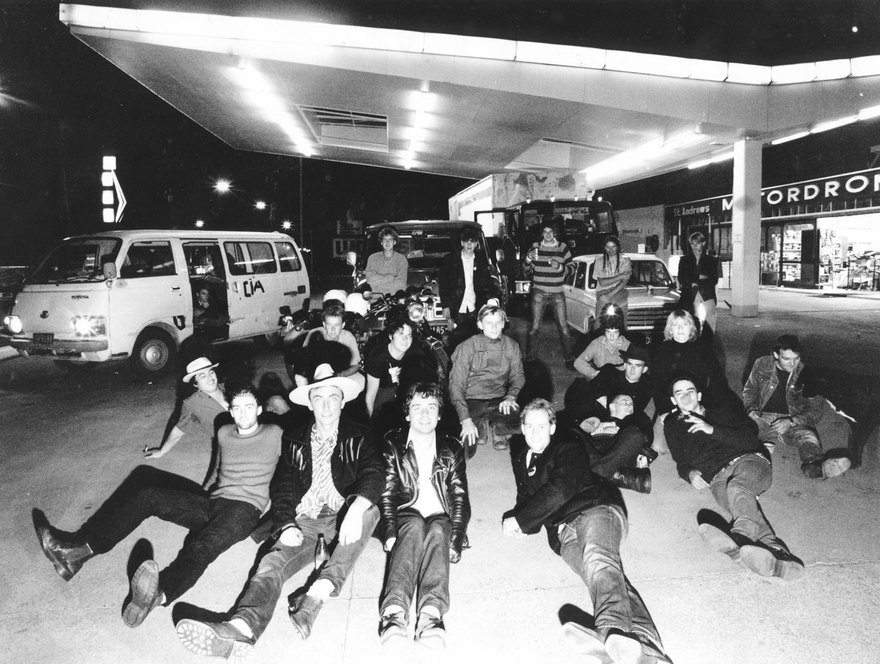
The Looney Tours contingent assembles for its national tour, February 1984. Centre, front: Martin Phillipps in his leather jacket.
Chris Matthews
One of my favourite Chills songs right from the beginning was ‘Oncoming Day’, Martin Phillipps’ statement of intent about just fuckin’ being present in life and going for what you want and not giving up, and it always went off at their gigs. In late 85/early 86 The Chills (by this stage Martin P., Martin Kean, Peter Allison, Alan Haig) had just flown back from playing in London to start a New Zealand tour to promote The Lost EP, with the first gig being at Mainstreet. The band landed at Auckland Airport and drove straight to the venue. Martin P. was visibly jet lagged and exhausted and looked volatile and a little unhinged, but he got his second or third wind and then powered through their set with more anger and emotion than I’d ever seen and it was unbelievably exhilarating.
They played ‘Oncoming Day’ last in the set, like the storming punk song it had always promised to be in earlier shows but never quite tipped over the edge of madness, and by that stage Martin had wound himself up into an exhausted and righteous fury and at the end of the song he took his beautiful handmade acoustic 12-string, smashed it into irreparable kindling on the stage and then just walked off. It was one of those WOW moments. It was better than The Who’s Pete Townshend and his auto-destructive guitar smashing, because Pete did it at almost every gig in the 60s. But it seemed so utterly out of Martin’s character to destroy something he loved in front of 1500 people that you knew you’d witnessed something very special: a man on the edge of a nervous breakdown.
I never saw him do that on stage again and that was fine, but all of us lose it completely sometimes and I was lucky enough to have seen Martin lose it big time – and it was magnificent.
Chris Matthews is a musican and founding member of Children’s Hour and Headless Chickens
Russell Brown
It was my privilege to see The Chills play many times; often enough to experience the wild exhilaration of a good night and the deflated feeling of one that didn’t work, the drudgery and delights of touring. It was always about the songs and the magic and potential within them. Martin’s lifelong duty was to those songs. But I’ll also remember the friendship and the endless conversations, the sharing of dreams and ideas. It breaks my heart to know we’ll never speak again, but I’m so glad we did. And I’m grateful that the door to Martin’s kaleidoscope world will always be open through the songs he made.
Russell Brown – journalist, friend and member of the Flying Nun Foundation
An audio tribute from William Dart, RNZ National
--